白鲸Moby Dick作品分析(课堂PPT)
- 格式:ppt
- 大小:1.45 MB
- 文档页数:16
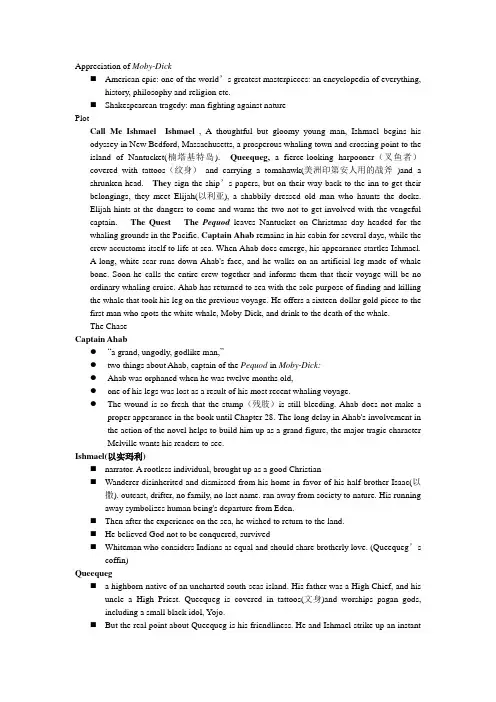
Appreciation of Moby-Dick⏹American epic: one of the world’s greatest masterpieces: an encyclopedia of everything,history, philosophy and religion etc.⏹Shakespearean tragedy: man fighting against naturePlotCall Me Ishmael Ishmael, A thoughtful but gloomy young man, Ishmael begins his odyssey in New Bedford, Massachusetts, a prosperous whaling town and crossing point to the island of Nantucket(楠塔基特岛). Queequeg, a fierce-looking harpooner(叉鱼者)covered with tattoos(纹身)and carrying a tomahawk(美洲印第安人用的战斧)and a shrunken head. They sign the ship’s papers, but on their way back to the inn to get their belongings, they meet Elijah(以利亚), a shabbily dressed old man who haunts the docks.Elijah hints at the dangers to come and warns the two not to get involved with the vengeful captain. The Quest The Pequod leaves Nantucket on Christmas day headed for the whaling grounds in the Pacific. Captain Ahab remains in his cabin for several days, while the crew accustoms itself to life at sea. When Ahab does emerge, his appearance startles Ishmael.A long, white scar runs down Ahab's face, and he walks on an artificial leg made of whalebone. Soon he calls the entire crew together and informs them that their voyage will be no ordinary whaling cruise. Ahab has returned to sea with the sole purpose of finding and killing the whale that took his leg on the previous voyage. He offers a sixteen-dollar gold piece to the first man who spots the white whale, Moby-Dick, and drink to the death of the whale.The ChaseCaptain Ahab●“a grand, ungodly, godlike man,”●two things about Ahab, captain of the Pequod in Moby-Dick:●Ahab was orphaned when he was twelve months old,●one of his legs was lost as a result of his most recent whaling voyage.●The wound is so fresh that the stump(残肢)is still bleeding. Ahab does not make aproper appearance in the book until Chapter 28. The long delay in Ahab's involvement in the action of the novel helps to build him up as a grand figure, the major tragic character Melville wants his readers to see.Ishmael(以实玛利)⏹narrator. A rootless individual, brought up as a good Christian⏹Wanderer disinherited and dismissed from his home in favor of his half brother Isaac(以撒). outcast, drifter, no family, no last name. ran away from society to nature. His running away symbolizes human being's departure from Eden.⏹Then after the experience on the sea, he wished to return to the land.⏹He believed God not to be conquered, survived⏹Whiteman who considers Indians as equal and should share brotherly love. (Queequeg’scoffin)Queequeg⏹ a highborn native of an uncharted south-seas island. His father was a High Chief, and hisuncle a High Priest. Queequeg is covered in tattoos(文身)and worships pagan gods, including a small black idol, Yojo.⏹But the real point about Queequeg is his friendliness. He and Ishmael strike up an instantcomradeship.Themes1.Individual Vs. Nature2.(Ahab) versus Nature (symbolized by Moby-Dick)3.Tragic hero\noble4.Tragedy of man: revenge on nature5.Anyone who wants to revenge will be defeatedGod and Religion⏹religion and God's role in the natural world. westward.⏹God and man, who is the controller⏹Nature and man (Newton: man can study\examine nature)Symbols⏹Symbols are objects, characters, figures, or colors used to represent abstract ideas orconcepts.voyage- "search and discovery, the search for the ultimate truth of experience."the Pequod -the ship of the American soulMoby Dick---a symbol of good and evilits whiteness--- paradoxical colorThe Pequod⏹Named after a Native American tribe in Massachusetts⏹did not long survive the arrival of white men and thus turned to be an extinction⏹the Pequod is a symbol of doom.⏹It is painted a gloomy black and covered in whale teeth and bones, --violent death. It is,in fact, marked for death. Adorned (decorate) like a primitive coffin, the Pequod becomes one.⏹American dream :Ishmael thought he found dream and freedom in it.⏹Others sacrifices for the whiteMoby Dick⏹To the Pequod's crew⏹An unknown God whose whiteness represents goodness and tranquility, evil and violence.⏹Ahab : Moby Dick is a manifestation of all that is wrong with the world, and he feels thatit is his destiny to erase this symbolic evil.⏹it represents the destruction of the environment by expansion and exploitation in the 19th⏹For the author and the readers, Ishmael, it is a mystery of the universeQueequeg's Coffin⏹Queequeg‘s coffin alternately symbolizes life and death.⏹Queequeg has it built when he is seriously ill, but when he recovers, it becomes a chestto hold his belongings and an mark of his will to live. He make the knowledge tattooed on his body last forever, by carving it onto the coffin’s lid.⏹The coffin further comes to symbolize life, in a morbid way, when it replaces thePequod…s life buoy(救生衣). When the Pequod sinks, the coffin becomes Ishmael's buoy, saving not only his life but the life of the narrative that he will pass on.The novel can be understood from three levels⏹ 1. It is a novel of journey and whale catching.⏹ 2. It is a conflict between Captain Ahab and Moby Dick.⏹ 3.It is a story of Ishmael, his thought about human body’s ego realization, therelationship between man and nature, man and God, man and man, etc.Melville’s views of lifea. negative attitude towards life.b. One of the major themes of his is alienation (far away from each other.c. Other themes: loneliness, suicidal individualism (individualism causing disaster and death), rejection and quest, confrontation of innocence and evil, doubts over the comforting 19th-century idea of progressMelville’s contr ibution to American literature and featuresAutobiographical elements, Moby-Dick for instance SymbolismAhab Moby dick AND Sea whiteness Pequod VoyageThe style of Melville⏹There is a threefold quality in his writing; the style of fact, the style of oratory celebratingthe fact, and the style of meditation.⏹His style is highly symbolic and metaphorical. The novel has many non-narrative chapters,and this is how Melville changed an adventure story into a philosophical novel.⏹He used the technique of multiple views to achieve the effect of ambiguity.⏹Melville manages to achieve the effect of ambiguity through employing thetechnique of multiple view of his narratives.O Captain My CaptainO Captain my Captain! our fearful trip is done,The ship has weathered every rack(刑架), the prize we sought is won,The port is near, the bells I hear, the people all exulting,While follow eyes the steady keel, the vessel grim and daring;But O heart! heart! heart!O the bleeding drops of red,Where on the deck my Captain lies,Fallen cold and dead.O Captain! my Captain! rise up and hear the bells;Rise up--for you the flag is flung for you the bugle trills,For you bouquets and ribboned wreaths for you the shores a-crowding,For you they call, the swaying mass, their eager faces turning;Here Captain! dear father!This arm beneath your head!It is some dream that on the deck,You've fallen cold and dead.My Captain does not answer, his lips are pale and still;My father does not feel my arm, he has no pulse nor will;The ship is anchored safe and sound, its voyage closed and done;From fearful trip the victor ship comes in with object won;Exult O shores, and ring O bells!But I, with mournful tread,Walk the deck my Captain lies,Fallen cold and dead.。
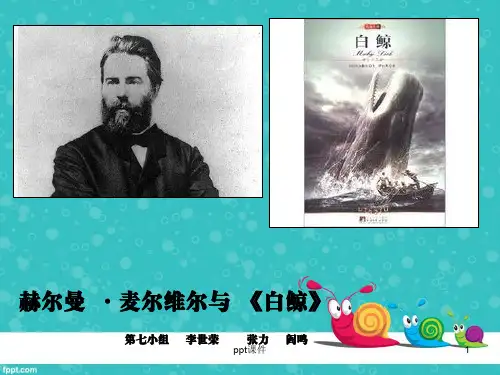




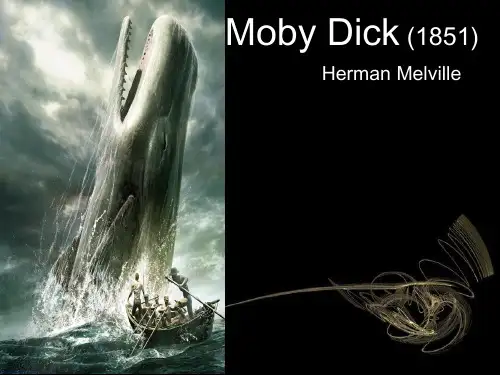


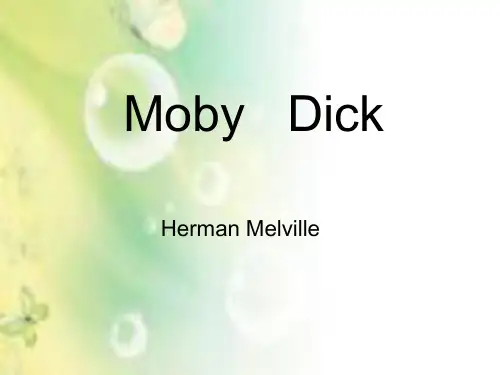
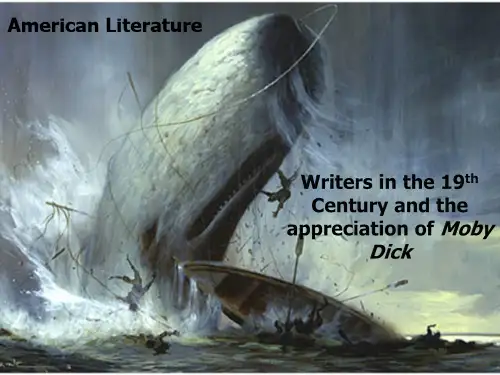
Moby-Dick白鲸解析Appreciation of Moby-DickAmerican epic: one of the world’s greatest masterpieces: an encyclopedia of everything,history, philosophy and religion etc.Shakespearean tragedy: man fighting against naturePlotCall Me Ishmael Ishmael, A thoughtful but gloomy young man, Ishmael begins his odyssey in New Bedford, Massachusetts, a prosperous whaling town and crossing point to the island of Nantucket(楠塔基特岛). Queequeg, a fierce-looking harpooner (叉鱼者)covered with tattoos(纹身)and carrying a tomahawk(美洲印第安人用的战斧)and a shrunken head. They sign the ship’s papers, but on their way back to the inn to get their belongings, they meet Elijah(以利亚), a shabbily dressed old man who haunts the docks.Elijah hints at the dangers to come and warns the two not to get involved with the vengeful captain. The Quest The Pequod leaves Nantucket on Christmas day headed for the whaling grounds in the Pacific. Captain Ahab remains in his cabin for several days, while the crew accustoms itself to life at sea. When Ahab does emerge, his appearance startles Ishmael.A long, white scar runs down Ahab's face, and he walks on an artificial leg made of whalebone. Soon he calls the entire crew together and informs them that their voyage will be no ordinary whaling cruise. Ahab has returned to sea with the sole purpose of finding and killing the whale that took his leg on the previous voyage. He offers a sixteen-dollar gold piece to the first man who spots the whitewhale, Moby-Dick, and drink to the death of the whale.The ChaseCaptain Ahab●“a grand, ungodly, godlike man,”●two things about Ahab, captain of the Pequod in Moby-Dick:●Ahab was orphaned when he was twelve months old,●one of his legs was lost as a r esult of his most recent whaling voyage.●The wound is so fresh that the stump(残肢)is still bleeding. Ahab does not make aproper appearance in the book until Chapter 28. The long delay in Ahab's involvement in the action of the novel helps to build him up as a grand figure, the major tragic character Melville wants his readers to see.Ishmael(以实玛利)narrator. A rootless individual, brought up as a good ChristianWanderer disinherited and dismissed from his home in favor of his half brother Isaac(以撒). outcast, drifter, no family, no last name. ran away from society to nature. His running away symbolizes human being's departure from Eden.Then after the experience on the sea, he wished to return to the land.He believed God not to be conquered, survivedWhiteman who considers Indians as equal and should share brotherly love. (Queequeg’scoffin)Queequega highborn native of an uncharted south-seas island. His father was a High Chief, and hisuncle a High Priest. Queequeg is covered in tattoos(文身)and worships pagan gods, including a small black idol, Yojo.But the real point about Queequeg is his friendliness. He and Ishmael strike up an instantcomradeship.Themes1.Individual Vs. Nature2.(Ahab) versus Nature (symbolized by Moby-Dick)3.Tragic hero\noble4.Tragedy of man: revenge on nature5.Anyone who wants to revenge will be defeatedGod and Religionreligion and God's role in the natural world. westward.God and man, who is the controllerNature and man (Newton: man can study\examine nature) SymbolsSymbols are objects, characters, figures, or colors used to represent abstract ideas orconcepts.voyage- "search and discovery, the search for the ultimate truth of experience."the Pequod -the ship of the American soulMoby Dick---a symbol of good and evilits whiteness--- paradoxical colorThe PequodNamed after a Native American tribe in Massachusettsdid not long survive the arrival of white men and thus turned to be an extinctionthe Pequod is a symbol of doom.It is painted a gloomy black and covered in whale teeth and bones, --violent death. It is,in fact, marked for death. Adorned (decorate) like a primitive coffin, the Pequod becomes one.American dream :Ishmael thought he found dream and freedom in it.Others sacrifices for the whiteMoby DickTo the Pequod's crewAn unknown God whose whiteness represents goodness and tranquility, evil and violence.Ahab : Moby Dick is a manifestation of all that is wrong with the world, and he feels thatit is his destiny to erase this symbolic evil.it represents the destruction of the environment by expansion and exploitation in the 19thFor the author and the readers, Ishmael, it is a mystery of the universeQueequeg's CoffinQueequeg‘s coffin alternately symbolizes life and death.Queequeg has it built when he is seriously ill, but when he recovers, it becomes a chestto hold his belongings and an mark of his will to live. He make the knowledge tattooed on his body last forever, by carving it onto the coffin’s lid.The coffin further comes to symbolize life, in a morbid way, when it replaces thePequod…s life buoy(救生衣). When the Pequod sinks, the coffin becomes Ishmael's buoy, saving not only his life but thelife of the narrative that he will pass on.The novel can be understood from three levels1. It is a novel of journey and whale catching.2. It is a conflict between Captain Ahab and Moby Dick.3.It is a story of Ishmael, his thought about human body’s ego realization, therelationship between man and nature, man and God, man and man, etc.Melville’s views of lifea. negative attitude towards life.b. One of the major themes of his is alienation (far away from each other.c. Other themes: loneliness, suicidal individualism (individualism causing disaster and death), rejection and quest, confrontation of innocence and evil, doubts over the comforting 19th-century idea of progressMelville’s contr ibution to American literature and features Autobiographical elements, Moby-Dick for instance SymbolismAhab Moby dick AND Sea whiteness Pequod VoyageThe style of MelvilleThere is a threefold quality in his writing; the style of fact, the style of oratory celebratingthe fact, and the style of meditation.His style is highly symbolic and metaphorical. The novel has many non-narrative chapters,and this is how Melville changed an adventure story into a philosophical novel.He used the technique of multiple views to achieve the effect of ambiguity.Melville manages to achieve the effect of ambiguity through employing thetechnique of multiple view of his narratives.O Captain My CaptainO Captain my Captain! our fearful trip is done,The ship has weathered every rack(刑架), the prize we sought is won,The port is near, the bells I hear, the people all exulting,While follow eyes the steady keel, the vessel grim and daring;But O heart! heart! heart!O the bleeding drops of red,Where on the deck my Captain lies,Fallen cold and dead.O Captain! my Captain! rise up and hear the bells;Rise up--for you the flag is flung for you the bugle trills,For you bouquets and ribboned wreaths for you the shores a-crowding,For you they call, the swaying mass, their eager faces turning;Here Captain! dear father!This arm beneath your head!It is some dream that on the deck,You've fallen cold and dead.My Captain does not answer, his lips are pale and still;My father does not feel my arm, he has no pulse nor will;The ship is anchored safe and sound, its voyage closed and done;From fearful trip the victor ship comes in with object won;Exult O shores, and ring O bells!But I, with mournful tread,Walk the deck my Captain lies,Fallen cold and dead.。